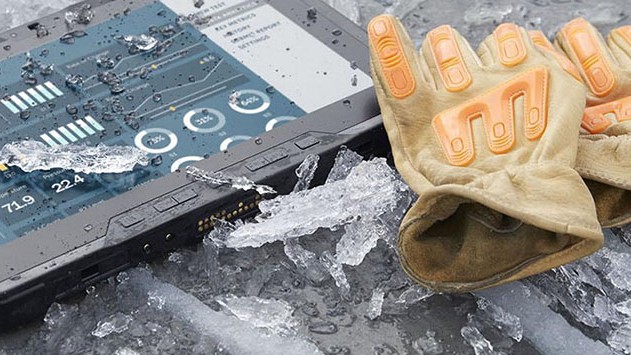It may not seem like a fair comparison to pit a common iPad against a Rugged Industrial Tablet, but with the prevalence of handheld devices in the manufacturing industry, it’s important to know what your tech can do.
The major differences lie in the physical durability of each device, the customization possibilities, application compatibility, and in your connectivity options. These are features that could make or break your workflow or even decommission your device and set back production. When your operations rely heavily on the use of tablets, you need to know that it’s up to the task. Let’s delve into the details of how an iPad and a Rugged Tablet would perform in a factory setting.
Device Durability
Article Guide
When it comes to durability, we’re talking about how well your device can withstand the conditions of its environment. Manufacturing floors are busy spaces filled with the constant hustle of people and equipment. Throughout the day, iPads or Rugged Tablets are transferred from person to person and across workstations. As an integral part of the workflow, they are going to see a lot of use and will be exposed to all manner of dust and moisture as well.
Rugged industrial tablets are built with such environments in mind. They are tested and rated based on how difficult it is for dust, moisture, and other contaminants to penetrate the device and cause damage. A rugged tablet with an IP65 rating is completely sealed against dust particulates and can brave direct jets of water without compromising performance. The addition of chemically hardened glass and industrial-grade components also means they can handle drops and impacts; a fall won’t bring your operations to a grinding halt because rugged tablets are made for extreme conditions and rough day-to-day use.
The iPad is built for the average consumer so it isn’t rugged or water-resistant. In fact, it has no Ingress Protection (IP) rating at all, meaning there’s no formal measure of how dust and waterproof it is. This isn’t a deal breaker for the leisure user because they don’t necessarily plan on sharing a shower with their tablet, but for the industrial employee working near debris and moisture-producing equipment like water jet cutters and woodworking tools, certain insurance against those contaminants is a must. Unfortunately, you also can’t count on an iPad to hold its own against a fall or other impact. Even with a strong case to protect the body of the device, you’d be hard-pressed to find a comparable form of protection for the notoriously fragile screens.
Customization Options
Customization is all about how well a device can fit into and enhance your workflow. In a manufacturing environment, handhelds like tablets can be integrated with your Internet of Things (IoT), mounted at workstations or into heavy machinery, and used as a Human-Machine Interface (HMI).
Theoretically, anyway, that’s what you would want your device to be capable of doing. iPads are beautiful pieces of hardware, but their customization is limited to the needs of the average consumer like different color trims and storage expansion. On the other hand, modern iPad designs do allow for heightened security like fingerprint readers or facial recognition software. In a regrettably counterproductive way, Apple’s innovative streak can actually be a hindrance to a factory’s healthy operation. Many factories and manufacturing plants operate on legacy software and hardware and need older ports to support their devices and tools. You may find it difficult or impossible to integrate a modern iPad featuring only the latest connection ports with your existing equipment.
Industrial tablets have fewer limitations and, as a result, have quite a bit more in the way of customization. In addition to numerous full-sized ports of varying types, these tablets can be equipped with integrated barcode scanners for asset and inventory management, RFID and smart card readers, and even biometric fingerprint readers for seamless integration with the authentication processes a plant already employs. Another customization feature the rugged tablet boasts over the iPad is the VESA mount docking station. This allows users to mount the unit anywhere, including a forklift, or to quickly pair the device with a desktop workstation.
Application Compatibility
Factory operations are intensely tied to their software, most notably their Enterprise Resource Planning (ERP) and Warehouse Management Systems (WMS). In many cases, a device’s ability to play nicely with these programs is the main selling point for factory management. The last thing they want to hear is that they need to uproot their entire infrastructure because their new devices don’t support an integral program of theirs.
Unfortunately, this can often be the case with iPads since they don’t support many key programs — like Microsoft Dynamics — which ultimately forces management to resort to the watered down alternatives they can find on the app store. The great thing about Apple products is that they work incredibly well with other Apple products. When you try to incorporate them into a mixed system however, you are likely to struggle with getting all the elements to cooperate.
A rugged industrial tablet that runs either Windows or Linux bypasses this issue simply by supporting these most used industrial software systems. As an added perk, they even allow employees to upload information in real-time thanks to the aforementioned peripherals like barcode scanners and authentication hardware.
Wi-Fi/LTE Functionality
Internet connectivity is an essential feature for a manufacturing environment as it allows for efficient data processing, timely sharing, and access to cloud-based applications like Software as a Service (SaaS). This is especially important for tablets in this industry when simply forgetting to perform system updates can disrupt their functionality. Over the cloud, factory-wide compatibility can be kept in check as regular system updates go out to all devices at once.
Today, Apple products are either Wi-Fi enabled or Wi-Fi and LTE enabled. The advantage of choosing a device with 3G/4G LTE connectivity means users can exercise the full functionality of their tablets even in areas with poor or no Wi-Fi connection. They can also use them to provide an internet hotspot for other Wi-Fi enabled instruments. In today’s connected world, it shouldn’t be difficult to find tablets with these native capabilities.
Rugged industrial tablets also have LTE capabilities and can similarly be used in and out of the factory without disruption. A notable difference, however, is in the hardware. Concerns arise when more connected devices are added to the network because possible entry points for cybersecurity threats instantly increase. For an added layer of data protection, rugged tablets feature Trusted Platform Module (TPM) Technology 2.0. This hardware-based security measure is designed to encrypt and decrypt information to safeguard sensitive data from potential hackers.
Battery Life
The battery life of handheld devices in your industry is the difference between efficient workflows and wasteful downtime. It’s important that the devices you employ are capable of keeping pace with your day-to-day operations.
Apple claims their iPad can be used for 10 hours before needing to be plugged in for a charge. A selling point for the average consumer for sure, but battery life can vary wildly based on the applications being run and the intensity of the work performed. Run the right applications for long enough, and that 10 hour battery life can quickly drop to 8 or 7. Once that tablet runs out of juice, it might as well be an ornate brick as it sits next to a wall, charging for the next several hours. Once more, this isn’t an issue for the average user, but for the factory worker who needs to be on the move constantly throughout the work day, it’s a matter of lost productivity.
Rugged tablets with hot swappable batteries eliminate this problem. With two batteries inside the tablet at a time, an employee can replace them one-by-one with charged batteries without powering down the device. This both removes the need to periodically retire a device for charging and ensures that valuable data and information isn’t deleted or corrupted thanks to a sudden power outage. Theoretically, this also means the device can operate 24 hours a day, 7 days a week.
The Verdict: Industrial Tablets for the Industrial Workplace
iPads and other consumer-grade tablets fulfill a purpose and fill a need for their respective consumers. In a manufacturing role, however, these devices are undoubtedly forced to perform in a manner inconsistent with their design and away from their intended environment.
Factories, industrial plants, and manufacturers that leverage a tool tailored for them will ultimately see the most success and the most seamless assimilation of their new tablets. This is why an industrial-grade rugged tablet is the clear choice for powerful, effective, and versatile applications in the industrial workplace.
To see just how durable Cybernet rugged tablets are, watch our drop-test on YouTube. If you’d like to learn more and discover ways to implement them in your factory operations, contact a Cybernet expert today.
How to Choose the Best Rugged Tablet for Construction
June 14, 2022
Your construction company wants tablets for its crews out in the field. The reasons you get vary from increased worker safety to the upcoming construction boom. You have been tasked to select those tablets. Where do…
0 Comments10 Minutes
Why Choose Rugged Tablets over Consumer Tablets
January 12, 2016
As technology continues to play a more integral in the way companies operate, many are now opting to use mobile tablet computers for their business purposes. In fact, According to Quarterly Mobile PC Shipment and…
0 Comments4 Minutes
You Can't
Learn from a Pop-up
But we can deliver knowledge to your inbox!
We dive deep in the industry looking for new trends, technology, news, and updates. We're happy to share them with you.
Knowledge, News, and Industry Updates Right in Your Inbox




